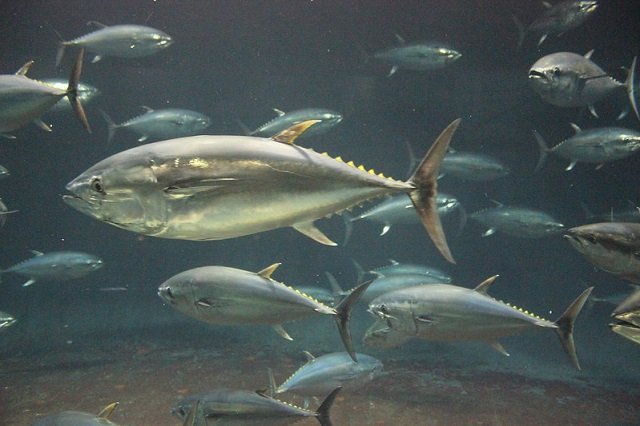
The Aquatic Life Institute (ALI) has released the second edition of its aquaculture certification benchmark tool, which analyzes current welfare requirements within the primary cultivation standards of 7 global seafood product certification schemes.
The first edition of the benchmark informed organizations, consumers, producers, retailers, and seafood product labeling programs about the welfare of aquatic animals as a high-priority element in the certification industry. This second edition further clarifies and highlights the criteria and interventions that translate into significant changes to improve and implement positive welfare practices for farmed aquatic animals.
The main areas of assessment include the five pillars of aquatic animal welfare defined by the Aquatic Life Institute: water quality, population density and space requirements, environmental enrichment, food composition, and stunning and slaughter.
Second Edition of Animal Welfare Report
This second edition also includes the evaluation of certifiers’ responses to concerns about new species entering the aquaculture supply chain and harmful practices already in place: rejecting the introduction of octopus/cephalopods farming, prohibiting the use of insects in fish feed, and banning the cruel practice of eye-stalk ablation in shrimp farming.
This report aims to highlight current animal welfare standards in the industry while also identifying opportunities to improve conditions for aquatic animals on farms. We are greatly encouraged by certifiers’ responses and commitment to the assessment process, as well as their commitment to transparency and accountability.
Evaluated Certifiers
Global Animal Partnership (GAP), RSPCA Assured, Naturland, Friend of the Sea, GLOBALGAP, Best Aquaculture Practices (BAP), and Aquaculture Stewardship Council (ASC) were evaluated and rated based on 5 main criteria (water quality, population density/space requirements, environmental enrichment, food composition, stunning/slaughter), each composed of 4 sub-criteria points.
“We have included a criterion for banning species with restrictions related to 3 different species (octopus/cephalopods/insects and eye-stalk ablation in shrimp). The scoring process concludes with the verification of ‘additional conditions,’ indicating the presence or absence of compliance, proper employee training, and environmental impact regulations,” the study highlights.
The top-rated certifier in this version is the draft of the Aquaculture Stewardship Council’s upcoming farm standard, which includes robust and ongoing monitoring and evaluation requirements for farmers related to key welfare indicators, including water quality parameters and population density considerations. This standard also properly addresses stunning best practices to ensure animals are unconscious at the time of slaughter.
“We evaluated the draft ASC aquaculture standard to encourage the certifier to include all significant animal welfare interventions in the final version. However, it is important to note that ASC’s final scores are subject to change based on what is included or not included in the final standard documents shared with the public. The Aquaculture Standard will be published for final public consultation in March 2024 and will come into effect in the fall of 2025. The Interpretation Manual is also likely to undergo public consultation in March 2024,” ALI reported.
Stay Always Informed
Join our communities to instantly receive the most important news, reports, and analysis from the aquaculture industry.
Progress in the Field
ALI’s report shows significant progress in the certification industry, especially in areas such as environmental enrichment, which is increasingly seen as a key aspect of ensuring positive experiences for animals. Most of the evaluated certifiers already include or plan to include enrichment in their interventions. This trend is encouraging and could also improve research on different species and types of enrichment.
The importance of banning octopus farming before its inception is also a clear statement for certifiers like RSPCA and Friend of the Sea, as they recognize that it is impossible to guarantee high welfare conditions for this species due to its behavior, sensitivity, and carnivorous diet.
Lastly, cruel industrial practices like eye-stalk ablation, which involves the removal of one or both eye stalks of female shrimp to accelerate sexual reproduction, are currently banned by most of the evaluated certifiers and retailers like Marks and Spencer in the UK. We hope that this practice will soon be banned throughout the industry.
Aquatic Life Institute will continue to work with certifications to continuously raise aquaculture certification standards each year to ensure ongoing progress in reducing the suffering of aquatic animals. The highly impactful nature of certifiers’ engagement, where a single change in a standard language can impact hundreds of millions of animals, encourages us to continue working in this space.
Future Steps
Aquatic Life Institute will continue to raise the bar for aquaculture certification standards each year to ensure continuous progress towards reducing the suffering of aquatic animals. The highly impactful nature of certifiers’ engagement, where even a single change in standard language can affect hundreds of millions of animals, motivates us to persist in this field.
“We have also initiated collaborations with corporations in the food industry to assess their interest in implementing certification in their supply chains, if they are not already doing so, and to enhance the overall welfare of aquatic animals. The benchmark remains a crucial tool in engaging our stakeholders with the industry, governments, and multilateral organizations, and it also supports global advocacy efforts to reduce animal suffering in aquaculture,” ALI emphasized.
Reference (open access)
Aquatic Life Institute. 2023. Aquaculture Certification Schemes Benchmark: Aquatic Animal Welfare (2nd edition). 58 p.
Editor at the digital magazine AquaHoy. He holds a degree in Aquaculture Biology from the National University of Santa (UNS) and a Master’s degree in Science and Innovation Management from the Polytechnic University of Valencia, with postgraduate diplomas in Business Innovation and Innovation Management. He possesses extensive experience in the aquaculture and fisheries sector, having led the Fisheries Innovation Unit of the National Program for Innovation in Fisheries and Aquaculture (PNIPA). He has served as a senior consultant in technology watch, an innovation project formulator and advisor, and a lecturer at UNS. He is a member of the Peruvian College of Biologists and was recognized by the World Aquaculture Society (WAS) in 2016 for his contribution to aquaculture.







